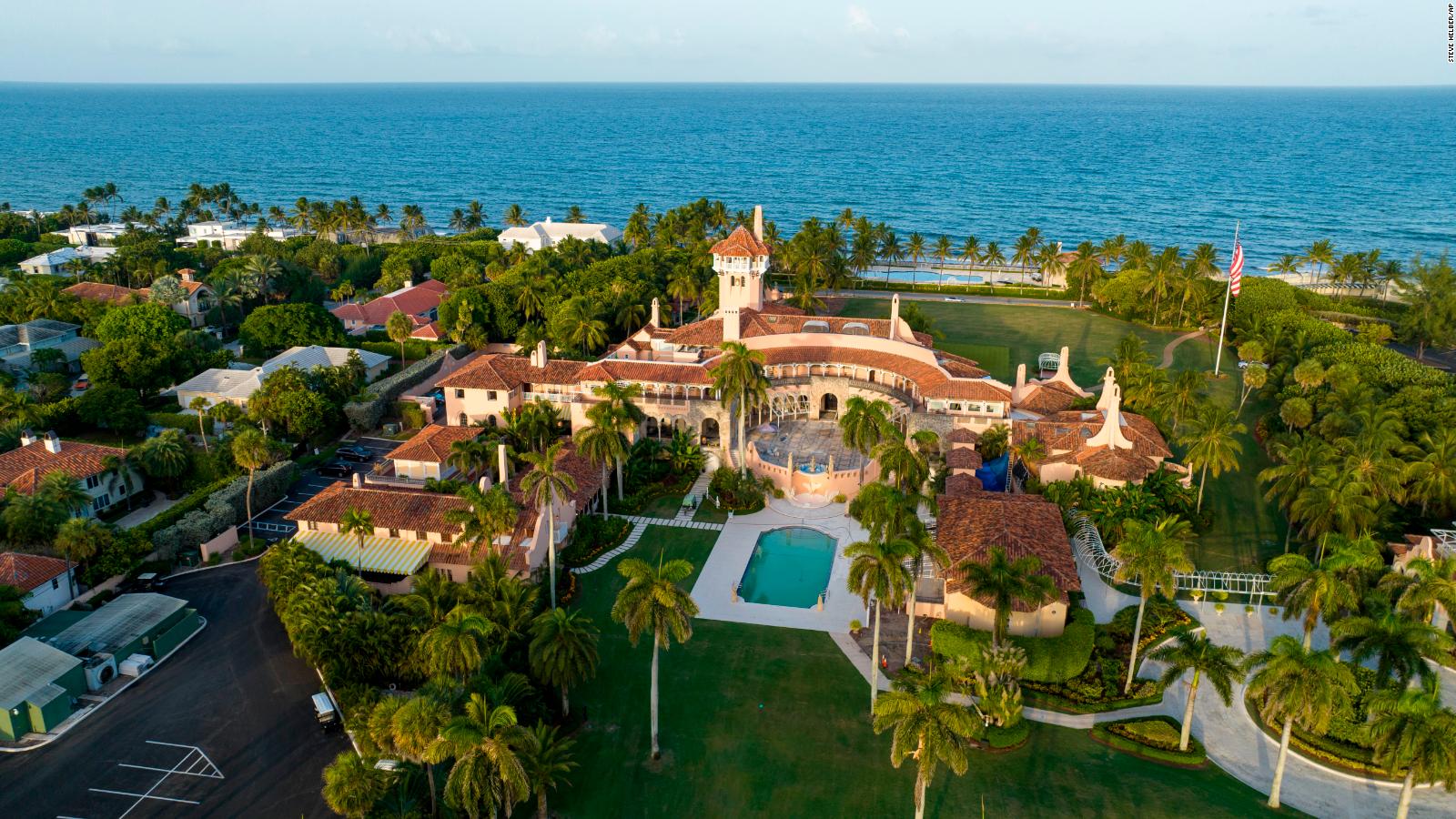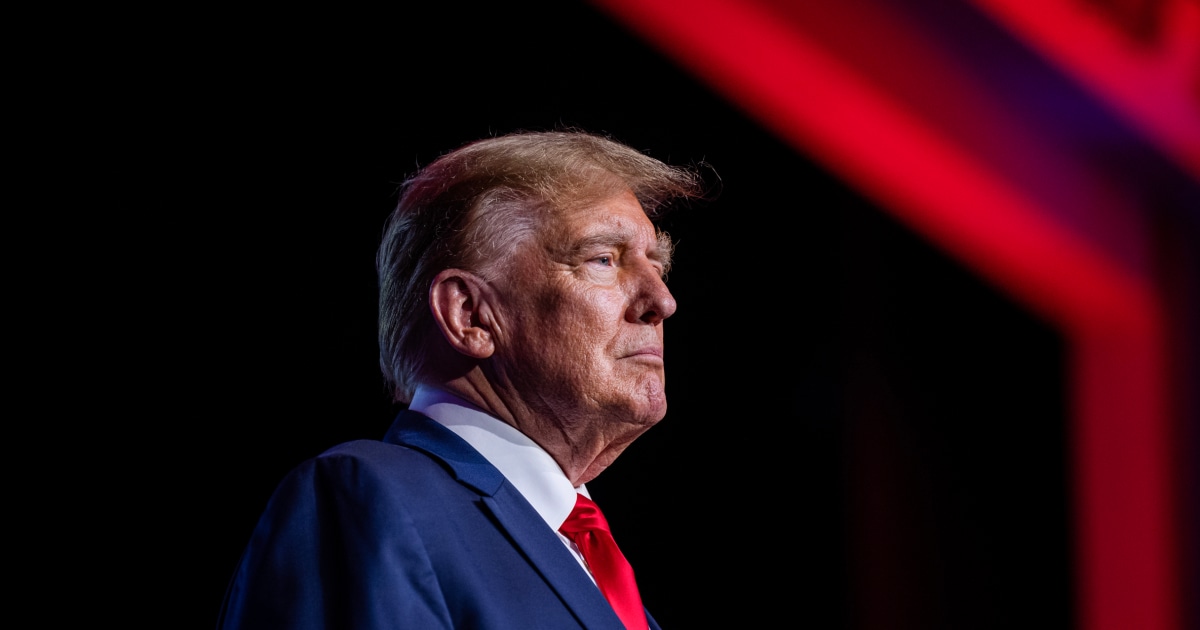What can change in the Trump investigation after the appearance of a key witness 1:17
(CNN) --
A report that FBI agents searched classified nuclear-weapon-related documents at Donald Trump's Florida resort could explain the urgency of the unprecedented operation at a former president's residence and leads to his standoff with the Department of Justice to a serious new level.
The Washington Post story could also undermine Republican lawmakers, who didn't wait for details of the case before criticizing a raid they say is more typical of a tyrannical state.
The latest development also further raises the stakes in a legal battle that is escalating after Attorney General Merrick Garland upped the ante on the former commander-in-chief and, in an unusual move, asked a court to declassify the search warrant and inventory of property taken from Trump's home.
Merrick Garland spoke about the unprecedented raid on Trump's home in Mar-a-Lago
The details of the newspaper's report came on another extraordinary day that re-enacted the chaos and recriminations of the Trump presidency, and carved out bitter new political divisions ahead of the former president's likely bid for the White House.
The Washington Post quoted people familiar with the investigation as saying federal agents were searching for classified nuclear weapons-related documents, among other items, at Trump's resort.
The people did not describe the documents in detail or whether they were related to nuclear weapons belonging to the United States or another nation.
CNN has not independently confirmed the report.
But if it turns out that Trump took such material from the White House, it would raise the question of why a former president would need such closely guarded secrets after leaving office.
The possibility of such material being stored in an unsecured facility, where guests come and go and where it would be potentially vulnerable to penetration by a foreign intelligence service, would alarm government officials.
advertising
As the legal battle over registration escalates, Trump has until 3 pm Miami time Friday to officially signal whether he will challenge Garland's move.
In a statement on his social network, Truth Social, late Thursday, the former president said he would not oppose the release of the documents related to the "unwarranted and unnecessary un-American raid and break-in" at his residence.
He did not say exactly what documents he would be willing to see released.
And the FBI search wasn't a raid;
was legally authorized by a court order approved by a judge who would have had to find probable cause that a crime had been committed.
The Washington Post: FBI raided Trump's Mar-a-Lago residence for classified nuclear documents
It's your move, Mr. former president
Garland's tactics have been very successful.
Search warrants are usually kept under seal to protect the reputation of the person to whom they apply.
But Trump himself broke the news of the search, thus breaking his own expectations of privacy, in order to orchestrate a political firestorm to discredit the investigation.
And if Trump were to fight to keep the document sealed, it would seem even more like he has something to hide.
"This is a professional move," Phil Mudd, a former FBI and CIA official, said of Garland's actions in "The Situation Room with Wolf Blitzer."
"This is not the move of a pawn. This is a move of something between a rook and a queen."
If Trump decided to challenge the disclosure of the order, a step that could neutralize GOP claims that the former president is a target of political victimization, his lawyers would have to explain why in court.
The judge in the case, who has received death threats and insults on social media from Trump supporters, could still decide to uphold the Justice Department's motion, even if the former president wants to keep the information secret.
"This is what it looks like when the rule of law fights Trump's lies," Nick Akerman, former assistant US attorney for the Southern District of New York, told CNN's Erin Burnett.
"I think it's extremely unlikely that Donald Trump is going to prevail here."
Garland's move is a clear attempt to push back the fury of Republican officials over the unprecedented search warrant at the former president's home.
Lawmakers, media pundits and Trump supporters have unleashed insane claims that the United States is now nothing more than a police state, with a Gestapo-like secret police, and has descended into tyranny.
ANALYSIS |
Here's why Trump's presidential records belong to the public
In deciding to appear before the cameras of the Department of Justice, Garland did not limit himself to calling Trump's attention and yielding to pressure from Republican leaders who have demanded to know the justification for the search.
She tried to protect the Department from him and the judicial process by insisting that every step of the investigation was deliberate.
His brief appearance, in which he took no questions, was scripted to counter specific criticisms and out-of-control right-wing conspiracy theories.
"Faithful adherence to the rule of law is the basic tenet of the Justice Department and of our democracy," Garland said.
“Defending the rule of law means applying the law uniformly, without fear or favoritism,” he said, implying that not even former presidents are protected if they are suspected of committing a crime.
Garland also came out in defense of the FBI and Justice Department rank and file, calling them "dedicated and patriotic public servants," while Trump's lackeys portray the office as a politicized arm of Democratic wiles.
The attorney general's remarks, a dramatic moment for Washington, were a sign of the extraordinary sensitivity and importance of the investigation into the former president.
The FBI generally says little about ongoing investigations unless charges are brought against someone, a step that, if it comes, seems a long way off in this case.
An unsealed search warrant will not comprehensively establish whether the department's action against Trump was justified or an overreach.
But Garland's initiative suggests firm confidence in whatever case the office is building against Trump.
It also shows that the Department, from the top, supports the decision to go ahead with a search, knowing that it would trigger an extraordinary and violent reaction from Trump.
The idea that the whole thing is just a politically motivated plot hatched by legal amateurs, Trump's essential defense against the process, is much harder to believe after Garland's remarks.
Ghitis: Trump knew he couldn't destroy documents 2:11
Trump's decision
Trump's attorneys have yet to respond to the Justice Department's motion.
The former president seems to have three options.
He could release the search warrant and inventory of items the FBI removed from his residence;
he could grant the Department's request that it be opened by the court;
or he could oppose the order being made public.
In a logical universe, the latter option would seem unlikely, since the former president broke his own privacy by breaking the news of the FBI search in a politicized statement Monday night.
And the Justice Department is essentially arguing in its court filing that the public's interest in knowing what actually led to the search is now greater than Trump's interest in keeping the details secret.
Public interest is possibly even greater in light of The Washington Post reporting on nuclear documentation.
"For me to come back now and say 'I don't want this' would be very weird and weird," said Jared Carter, a professor at Vermont Law School.
But Trump doesn't play by normal rules.
Given his lifelong history of exhausting all legal options to thwart accountability and the inability of judicial and political institutions to limit him, a counterintuitive legal strategy cannot be ruled out.
It is likely to become clear on Friday whether the former president will follow through on his promise not to oppose the release of documents in the case.
Biography of Judge Who Approved Mar-a-Lago Mar-a-Lago Raid Deleted After Internet Threats
Republicans change goals
Information about the FBI's search for nuclear documentation at Mar-a-Lago raises new questions for Republicans, who have been attacking the bureau and the Justice Department over the search without apparently knowing what it was.
In a perhaps telling sign of how Thursday night's events have messed up the messaging of Trump's usual supporters, the conservative House Freedom Caucus canceled a planned news conference on Mar-a-Lago's record hours. after the newspaper's report on the nuclear documents was published.
Garland's move early Thursday should have defused Republican demands that he speak publicly about the raid and release the warrant.
But as soon as the attorney general stopped talking, top Republicans demanded more.
"What I'm looking for is the foundation of the record," Republican Sen. Lindsey Graham said in a statement.
"Was the information provided to the judge sufficient and necessary to authorize a raid on the former president's home 90 days before the midterm elections? I'm urging, actually insisting, that the Justice Department and the FBI put their cards on the table." as to why this course of action was necessary," the Trump ally in South Carolina added.
Although Garland asked for the search warrant to be unsealed, which could be accompanied by an inventory of documents taken from Trump's residence, he did not ask for the unsealing of affidavits intended to show probable cause that a crime had been committed at the Trump residence. order request support.
So Graham made his appeal knowing that he is asking for a step that would violate traditional Justice Department guidelines, and could undermine any criminal case the FBI may eventually bring against the former president.
Trump Supporters Call for Violence After Mar-a-Lago Raid, Speak of “Cold Civil War”
Trump himself responded to Garland's appearance on camera with one of his trademark "witch hunt" posts on Truth Social.
It is impossible to verify the statements of a former president who routinely lied while in office.
But several of Trump's earlier claims that he was suddenly the subject of a "raid" and "siege" by FBI agents out of the blue were undermined by events on Thursday.
CNN's Evan Perez, Gabby Orr and Pamela Brown, for example, reported that federal investigators served a grand jury subpoena and seized documents from Mar-a-Lago in June.
This appears to indicate that Monday's search was a last resort and supports Garland's contention that the FBI took steps to ensure the raid caused as little disruption as possible.
But the attorney general is also trying a strategy that has perpetually failed under Trump: using facts and legal rules to tear down his wall of lies and falsehoods.
Some Trump allies have already floated another conspiracy theory: that the FBI planted documents at the former president's residence.
Nearly two years after Trump lost the last election, the nation faces another grueling challenge to the rule of law from the former president, who has twice been impeached.
The facts and the truth are once again the first victims.
Donald TrumpFBI





/cloudfront-eu-central-1.images.arcpublishing.com/prisa/A7TA7NG2IQY37UJTVBF42LOB6I.jpg)


/cloudfront-eu-central-1.images.arcpublishing.com/prisa/2C5HI6YHNFHDLJSBNWHOIAS2AE.jpeg)



